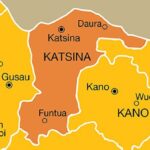As the financial crisis in Ghana festers, there are fears that its contagion effect could spread to Nigeria, depending on the choice that whoever emerges president in the 2023 general elections takes to address Africa’s biggest economy’s debt challenges.
Ghana, which Eurobonds have fallen by about 70 per cent, is planning a “haircut” or reduction in principal repayment of up to 30% to holders of these bonds, as well as a three-year moratorium on interest repayment on domestic bonds.
These are part of Ghana’s debt restructuring efforts to enable the country to conclude a $3 billion facility negotiations that started in July with the International Monetary Fund (IMF), Deputy Minister of Finance, Dr John Kumah, announced last week.
Discussions between both sides will resume on Thursday, December 1, and end on December 13, IMF said in a statement on Wednesday.
Ghana is discussing a bailout programme to enable it to fix its balance of payments deficit that spiked from $934.5 million in the first quarter of 2022 to about $2.5bn in June, and debt that reached as high as about 78% of GDP.
Analysts warn, however, that should Ghana’s plans sail through, this could become a model for whoever wins Nigeria’s presidential election in February, next year, a move which they say could dent the country’s financial sector.
“There could be a contagion and it would spread through the line of least resistance,” said a Lagos-based bond trader.
“If you are the next Nigerian president and you see what Ghana has done and the heavens did not fall, you might be tempted to do the same,” he pointed out.
“An incompetent Nigerian politician surrounded by sycophants may copy this wrong model. Their model is bad,” he added.
While the country awaits the positions of the other top presidential contenders, analysts warn that debt restructuring will not be easy.
Professor Apollos Nwaobia, head of accounting at Babcock University, Ogun State, said the bondholders’ decision would depend on how much of their principal they had received in repayment.
Analysts also fear that copying Ghana’s default option (which is what restructuring really means) will hurt not only the sovereign but all the Nigerian corporates that have issued Eurobonds. While there are no big Ghanaian corporations that have issued Eurobonds, there are many from Nigeria that have issued such instruments.
The difference between Nigeria and Ghana is that you don’t have big Ghanaian corporations that have issued Eurobonds. Among these are Seplat Petroleum, and some banks, including the Bank of Industry (BoI), Access Bank, Fidelity Bank, First Bank of Nigeria (FirstBank), United Bank for Africa UBA), among others.
“If you default at the foreign level, it is going to cascade down. And all of a sudden, the entire Nigerian financial assets will change overnight. Because those guys (the corporates) will be trapped; they will not be able to go back to the market,” notes the bond trader. “If you try to say you have defaulted on your bonds repayment obligations, you have sent this country 20 years backward.”
Some analysts see Ghana’s case as a precarious one, more so given that they are just asking only for $3bn from the Fund, an amount some consider too small for the challenges it brings to the country.
Ghana’s debt maturities and obligations are tighter than Nigeria’s, analysts point out. For Nigeria, the majority of the debt is in Naira with a foreign debt of $40bn of which Eurobonds are $15.6bn. Nigeria’s monthly interest expenses on the Eurobonds are $100m, and the next Eurobond maturity is $500m in July 2023 and there is no maturity in 2024.
Now, while Ghana is just asking for $3bn from the IMF, it faces $500m maturing in 2025; $1bn in 2026, and $2bn in 2027. Ghana’s interest payment in a year is $1.2bn.
So, looking at the interest payment for 2023 and 2024, it is $2.4bn; by the time they pay 2025 principal, which is already $3bn gone.




